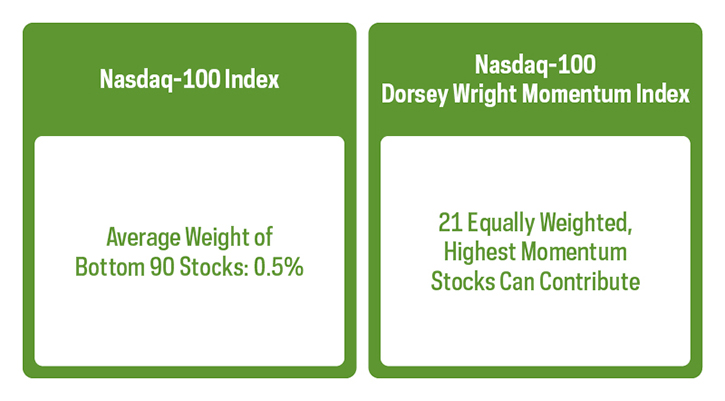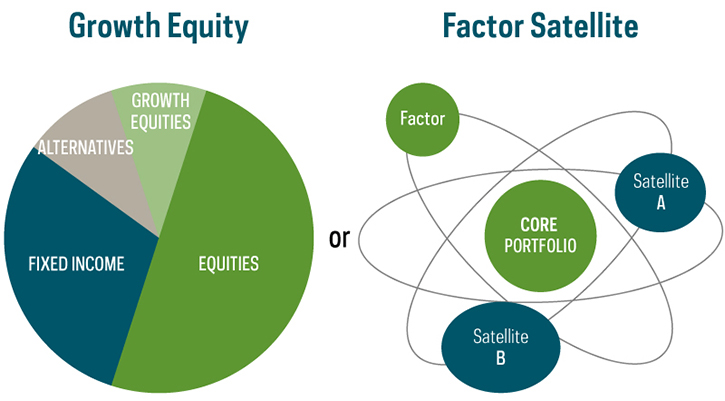Sponsored by ProShares
What Is Momentum Investing and How Does It Perform?
In investing, momentum is the tendency of stocks that have been outperforming to continue outperforming. The table below demonstrates the performance potential of momentum applied to large-cap stocks. The French Momentum Factor, a widely used benchmark for momentum, has displayed persistent outperformance relative to the S&P 500 and Russell 1000 Index.
Summary of Index Performance by Decade

Source: Kenneth R. French database (mba.tuck.dartmouth.edu/pages/faculty/ken.french/data_library.html), Morningstar, Bloomberg, ProShares.
1Calculated based on an equal-weighted composite of NYSE, AMEX and Nasdaq stocks in the top 70th percentile of momentum, based on returns for prior 2-12 month periods and market capitalization. The French Momentum Factor is shown for illustrative purposes only and does not represent the strategy or performance of the Nasdaq-100 Dorsey Wright Momentum Index or the ProShares Nasdaq-100 Dorsey Wright Momentum ETF (QQQA).
2S&P data available beginning 3/4/57.
3Russell 1000 Index data available beginning 1/1/84.
Dorsey Wright’s Relative Strength Approach: How It Works
Dorsey Wright employs a proprietary approach to momentum, called “Relative Strength,” that:
- Compares the relative performance of any group of stocks against one another.
- Determines buy or sell signals based on that relative performance.
- Adds up those buy and sell signals to determine which stocks have the greatest potential momentum and likelihood to continue outperforming.
- Charts the individual Relative Strength results as a simple matrix, making the approach easily scalable to any size group of stocks.
What Is Special About the Nasdaq-100 Index?
The Nasdaq-100 Index, the world’s preeminent large-cap growth index, tracks the performance of the 100 largest companies trading on the Nasdaq Stock Exchange (excluding financials). The Nasdaq-100 Index is home to well-known technology names like Apple, Microsoft and Alphabet, as well as category-defining companies from other key industries like Amgen, Starbucks and Tesla. The index has historically outperformed the S&P 500, returning cumulatively 694% versus 385% between 1999 and 2021.
The Nasdaq-100 Has Outperformed the S&P 500 by More Than 300% Over the Past 20 Years (Growth of $100, 3/4/99‒3/31/21)

Source: Nasdaq, Bloomberg, 3/4/99–3/31/21. Nasdaq-100 TR data available beginning 3/4/99. Index returns are for illustrative purposes only and do not represent fund performance. Indexes are unmanaged, and one cannot invest directly in an index. Index performance returns do not reflect any management fees, transaction costs or expenses. Past performance does not guarantee future results.
How Momentum Unlocks the Outperformance Potential of the Nasdaq-100 Index
Dorsey Wright created a matrix to compare the stocks of the Nasdaq-100 Index.
- They used historical performance data going back to 12/31/99 to generate rankings.
- Dorsey Wright divided the matrix rankings into quintiles of 20 securities and equally weighted each stock.
- Each quintile was then reconstituted and rebalanced at the end of every month.
They discovered that the top quintile (the top 20 ranked stocks with the most momentum) outperformed the Nasdaq-100 Total Return Index—13.18% per year versus 6.91% per year—over the test period (12/31/99–3/31/21). That outperformance indicates that a momentum strategy has the potential to enhance the Nasdaq-100’s already strong historical outperformance.
The Highest Momentum Stocks Have Outperformed
Matrix Quintile Returns for Nasdaq-100 Index 12/31/99–3/31/21

Source: Nasdaq Dorsey Wright, 12/31/99-3/31/21. This chart is for illustrative purposes only and does not represent fund performance. Indexes are unmanaged, and one cannot invest directly in an index. Index performance returns do not reflect any management fees, transaction costs or expenses. Past performance does not guarantee future results.
About the Nasdaq-100 Dorsey Wright Momentum Index
Dorsey Wright created the Nasdaq-100 Dorsey Wright Momentum Index to help investors take advantage of their findings about the potential of momentum.
- The index selects and equally weights the top 21 stocks ranked by Relative Strength every quarter.
- Stocks remain in the index until they fall to a certain sell threshold, in which case they will be replaced at the next quarterly reconstitution.
- This approach allows outperforming stocks to continue to "run" and portfolio turnover is reduced. The index also keeps pace with changing momentum trends in the Nasdaq-100 Index.
Equal Weighting: Less Concentration Risk

Source: Bloomberg, as of 3/31/21.
The Power of the ProShares Nasdaq-100 Dorsey Wright Momentum ETF
ProShares and Nasdaq Dorsey Wright partnered to launch the ProShares Nasdaq-100 Dorsey Wright Momentum ETF (QQQA).
- QQQA is the only ETF based on the Nasdaq-100 Dorsey Wright Momentum Index.
- It is also the first ETF focusing on select Nasdaq-100 Index stocks identified as having the greatest potential to outperform.
How to Use QQQA in a Portfolio

Hypothetical portfolio allocations are for illustrative purposes only. 75% calculated as either S&P Dow Jones or Morningstar Growth.
QQQA can fill a variety of needs, but seems to fit into two general portfolio allocations.
- Style-consistent large-cap growth allocation. Many momentum strategies regularly change their compositions, sometimes dramatically. QQQA’s strategy offers the potential for a more style-consistent approach. It invests in the Nasdaq-100 Index’s 21 top-ranked stocks for momentum, allowing the factor to speak. However, because over 75% of Nasdaq-100 stocks are classified as growth, QQQA's portfolio should reliably maintain a large-cap growth style.
- Satellite allocation. QQQA can be deployed as a factor-based satellite allocation in a well-diversified portfolio.
For more information, visit ProShares.com.
Investing involves risk, including the possible loss of principal. This ProShares ETF is non-diversified and entails certain risks, including imperfect benchmark correlation and market price variance, that may decrease performance. Please see their summary and full prospectuses for a more complete description of risks. There is no guarantee any ProShares ETF will achieve its investment objective.
Natural or environmental disasters, including pandemics and epidemics, have been and can be highly disruptive to economies and markets and have recently led, and may continue to lead, to increased market volatility and significant market losses.
Momentum investing emphasizes selecting stocks that have higher recent price performance compared to other stocks. Momentum can change quickly and changes may occur between index reconstitutions. Companies that previously exhibited high momentum may underperform other companies that did not exhibit high momentum. Certain investment styles may fall in and out of favor. If momentum investing is out of favor, the fund’s performance may lag behind other funds using different investment styles.
The fund concentrates its investments in certain sectors. Narrowly focused investments typically exhibit higher volatility.
Carefully consider the investment objectives, risks, charges and expenses of ProShares before investing. This and other information can be found in their summary and full prospectuses. Read them carefully before investing. Obtain them from your financial professional or visit ProShares.com.
Nasdaq® is a registered trademark of Nasdaq, Inc. and is licensed for use by ProShare Advisors LLC. ProShares ETFs have not been passed on by Nasdaq, Inc. or its affiliates as to their legality or suitability. ProShares ETFs based on the Nasdaq-100 Dorsey Wright Momentum Index are not issued, sponsored, endorsed, sold, or promoted by Nasdaq, Inc. or its affiliates, and they make no representation regarding the advisability of investing in ProShares ETFs. THESE ENTITIES AND THEIR AFFILIATES MAKE NO WARRANTIES AND BEAR NO LIABILITY WITH RESPECT TO PROSHARES.
ProShares are distributed by SEI Investments Distribution Co., which is not affiliated with the fund's advisor.
© PSA 2021 WS-2021-3740974.1





